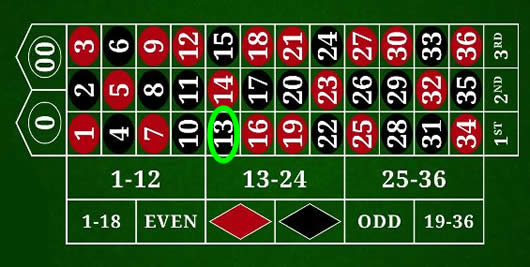Roulette is often seen More helpful hints as purely a game of luck, but it's not entirely random. Understanding roulette's statistical foundations can give players a considerable advantage in betting smartly. Analyzing data and identifying patterns on the roulette wheel can reveal critical insights into the likelihood of certain outcomes. Such insights are key to forming a well-informed betting strategy.
Key Takeaways
- Grasping roulette statistics is vital for enhancing your strategy and boosting your odds of success.Analyzing roulette data and using probability can help inform your strategy and make more informed betting decisions.Incorporating roulette statistics into your betting system can lead to better results and more consistent wins.Recognizing trends and patterns in roulette numbers can offer a significant advantage in predicting results and placing strategic bets.Employing statistical analysis can result in improved roulette outcomes and a more rewarding gameplay experience.
Expected value, best roulette software which shows the average result of a wager over time & accounts for payout potential and winning probability, is a key statistical idea in roulette. Through the computation of the expected value of multiple wagers, participants can discern which wagers carry a higher probability of financial gain & which carry greater risk. Armed with this knowledge, players can make smarter choices about where to allocate their chips.
The house edge, another key statistic, reflects the casino's built-in advantage over the players. Understanding these numbers can help players choose the most advantageous options because different roulette bets have different house edges. By familiarizing themselves with these statistics, players can boost their winning chances by adopting a more strategic approach.
Identifying Hot and Cold Numbers. One common method of analyzing roulette data involves searching for "hot" or "cold" numbers. Some players think that these numbers, which have either appeared frequently or infrequently in recent spins, may be more likely to appear in the future. Watching these patterns can guide you in placing more informed bets based on the wheel's recent performance, though it’s not a foolproof method.
Grasping Roulette Variance. Understanding variance is a key aspect of analyzing roulette data. Variance measures how much the outcome deviates from what is expected, helping to assess the risk of a bet.
You can allocate your chips more wisely and increase your chances of winning by examining the variance of various bets. Enhance Your Strategy with Data Analysis. These methods, combined with data analysis, can help you enhance your roulette strategy and make more informed wagers. You can lessen your losses and raise your chances of winning by spotting patterns and trends & knowing the degree of risk involved in various wagers. Probability is a fundamental concept in roulette statistics, and understanding it can lead to substantial strategic gains.
You can make more informed choices about where and how much to bet by calculating the likelihood of various outcomes. In the long run, this can help you minimize your losses and maximize your potential gains. One way to apply probability in your roulette strategy is by evaluating the odds of different bet types. For example, a straight bet on a single number offers a higher payout but lower odds, while an even-money bet on red or black has better odds but lower returns.
You can choose which bets to prioritize more strategically by comparing these probabilities to the possible payouts. A key element in using probability to inform your roulette strategy is understanding expected frequency. It represents how often a particular outcome is likely to Click here for more info occur over many spins, given its probability.
You can make more informed decisions about which bets have a higher chance of turning a profit over time by taking into account the expected frequency of each choice. Incorporating roulette statistics into your betting system can refine the strategic decisions you make about when and how to place certain bets. A popular strategy is using a progressive betting system, where you adjust your bet size based on previous spin results. You will be able to make better decisions about when to raise or lower your bets by using statistical analysis with this system. Another way to incorporate roulette statistics into your betting strategy is by combining different bet types.
For example, some players combine inside and outside bets to spread risk and boost potential earnings. You can make more calculated choices about how to spread your bets and improve your chances of winning by taking into account the statistics underlying each kind of wager. Bankroll management is also crucial when incorporating roulette statistics into your betting strategy. You can make better decisions about how much to wager and when to leave the table by studying the statistics underlying various bet kinds and comprehending the risks that go along with them. This approach helps you avoid substantial losses and ensures you retain enough chips to continue playing strategically.
Leveraging statistics to refine your strategy largely revolves around spotting patterns and trends in roulette numbers. Documenting each spin's outcome can help you detect any biases or irregularities that might affect the odds of certain outcomes. This information will help you make more informed decisions about which numbers to prioritize and where to place your bets. Using the "sleeping" or "awake" numbers in roulette is a popular method for finding patterns and trends in the numbers.

Studying the clustering patterns that emerge on the spinning software roulette wheel can reveal chances to exploit these trends and boost your odds of winning. Identifying Biases and Anomalies. One popular method is to examine past spin results and look for any anomalies or biases in the game using statistical models or algorithms. Using this analysis, you can make more strategic choices about where to place your bets and which numbers to prioritize.
Methods of Predictive Modeling. Utilizing predictive modeling techniques to project future outcomes based on past best roulette software data is another way to make use of statistical analysis. Studying past patterns and trends allows you to build models that predict the chances of certain numbers coming up in future spins.
This analysis can help you make more strategic bets based on statistical probabilities, though it's not a guarantee that the predictions will be accurate. Regression Analysis. When using statistical analysis to improve roulette results, it's also critical to take the idea of regression analysis into account. This involves examining variables such as past spin results and the likelihood of certain outcomes in future spins.
Through regression analysis, you can uncover correlations and patterns that can guide your decisions on bet placement and amounts. Utilizing data and trends to inform your betting strategy can increase your chances of winning, making roulette statistics a valuable tool to enhance your gameplay. Tracking the results of each spin and looking for biases or anomalies that could affect the likelihood of certain outcomes is an essential tip. By applying statistical analysis to this data, you can make smarter decisions about where to place your bets and which numbers to prioritize.
Considering utilizing a variety of bet kinds is another way to apply roulette statistics to improve your gameplay. Distributing your bets between inside and outside options can help spread your risk and increase your winning chances. By considering the stats linked to each bet type, you can strategically decide how to allocate your chips to maximize your winning potential. When using roulette statistics to improve your game, it's also crucial to think about utilizing a progressive betting system.
By linking your bet sizes to previous spin outcomes, you can make better decisions about when to adjust your wagers. Integrating statistical analysis into this system allows you to make more strategic choices about managing your bankroll and improving your chances of long-term success. In summary, understanding roulette statistics and incorporating them into your betting strategy can greatly boost your chances of winning at this popular casino game.
Enhance your betting system by leveraging statistical analysis, probability, pattern recognition, and data analysis to guide your decisions on bet placement and amounts. By following these strategies and tips, you can take your roulette game to the next level and improve your odds of winning.

FAQs

Understanding Roulette Statistics
Roulette statistics are the data and information collected from the results of roulette games. This data might cover the frequency of specific numbers or colors appearing, along with other patterns and trends.
How Roulette Statistics Can Enhance Your Strategy
Players can use roulette statistics to identify patterns and trends that inform smarter betting decisions. If, for example, a specific number has appeared more frequently, a player might choose to place a bet on that number.
What are some common roulette statistics to consider?
Some common roulette statistics to consider are the frequency of individual numbers, the distribution of red and black numbers, and previous spin results. These statistics can help players make more strategic bets.
Sources for Roulette Statistics
Roulette statistics are available from multiple sources, such as online databases, casino websites, and gambling forums. Some players even keep personal records of roulette results to analyze and inform their strategies.
Will Using Roulette Statistics Improve My Chances of Winning?
Although roulette statistics offer useful insights, it's crucial to remember that roulette is a game of chance, with each spin being independent of the last. Statistics can guide your strategy, but they don't guarantee a win.